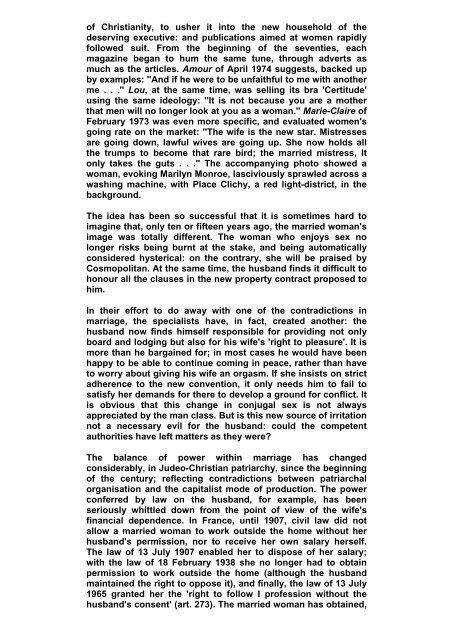emmanuel reynaud holy virility the social construction of masculinity
emmanuel reynaud holy virility the social construction of masculinity
emmanuel reynaud holy virility the social construction of masculinity
You also want an ePaper? Increase the reach of your titles
YUMPU automatically turns print PDFs into web optimized ePapers that Google loves.
<strong>of</strong> Christianity, to usher it into <strong>the</strong> new household <strong>of</strong> <strong>the</strong><br />
deserving executive: and publications aimed at women rapidly<br />
followed suit. From <strong>the</strong> beginning <strong>of</strong> <strong>the</strong> seventies, each<br />
magazine began to hum <strong>the</strong> same tune, through adverts as<br />
much as <strong>the</strong> articles. Amour <strong>of</strong> April 1974 suggests, backed up<br />
by examples: ''And if he were to be unfaithful to me with ano<strong>the</strong>r<br />
me . . .'' Lou, at <strong>the</strong> same time, was selling its bra 'Certitude'<br />
using <strong>the</strong> same ideology: ''It is not because you are a mo<strong>the</strong>r<br />
that men will no longer look at you as a woman.'' Marie-Claire <strong>of</strong><br />
February 1973 was even more specific, and evaluated women's<br />
going rate on <strong>the</strong> market: ''The wife is <strong>the</strong> new star. Mistresses<br />
are going down, lawful wives are going up. She now holds all<br />
<strong>the</strong> trumps to become that rare bird; <strong>the</strong> married mistress, It<br />
only takes <strong>the</strong> guts . . .'' The accompanying photo showed a<br />
woman, evoking Marilyn Monroe, lasciviously sprawled across a<br />
washing machine, with Place Clichy, a red light-district, in <strong>the</strong><br />
background.<br />
The idea has been so successful that it is sometimes hard to<br />
imagine that, only ten or fifteen years ago, <strong>the</strong> married woman's<br />
image was totally different. The woman who enjoys sex no<br />
longer risks being burnt at <strong>the</strong> stake, and being automatically<br />
considered hysterical: on <strong>the</strong> contrary, she will be praised by<br />
Cosmopolitan. At <strong>the</strong> same time, <strong>the</strong> husband finds it difficult to<br />
honour all <strong>the</strong> clauses in <strong>the</strong> new property contract proposed to<br />
him.<br />
In <strong>the</strong>ir effort to do away with one <strong>of</strong> <strong>the</strong> contradictions in<br />
marriage, <strong>the</strong> specialists have, in fact, created ano<strong>the</strong>r: <strong>the</strong><br />
husband now finds himself responsible for providing not only<br />
board and lodging but also for his wife's 'right to pleasure'. It is<br />
more than he bargained for; in most cases he would have been<br />
happy to be able to continue coming in peace, ra<strong>the</strong>r than have<br />
to worry about giving his wife an orgasm. If she insists on strict<br />
adherence to <strong>the</strong> new convention, it only needs him to fail to<br />
satisfy her demands for <strong>the</strong>re to develop a ground for conflict. It<br />
is obvious that this change in conjugal sex is not always<br />
appreciated by <strong>the</strong> man class. But is this new source <strong>of</strong> irritation<br />
not a necessary evil for <strong>the</strong> husband: could <strong>the</strong> competent<br />
authorities have left matters as <strong>the</strong>y were?<br />
The balance <strong>of</strong> power within marriage has changed<br />
considerably, in Judeo-Christian patriarchy, since <strong>the</strong> beginning<br />
<strong>of</strong> <strong>the</strong> century; reflecting contradictions between patriarchal<br />
organisation and <strong>the</strong> capitalist mode <strong>of</strong> production. The power<br />
conferred by law on <strong>the</strong> husband, for example, has been<br />
seriously whittled down from <strong>the</strong> point <strong>of</strong> view <strong>of</strong> <strong>the</strong> wife's<br />
financial dependence. In France, until 1907, civil law did not<br />
allow a married woman to work outside <strong>the</strong> home without her<br />
husband's permission, nor to receive her own salary herself.<br />
The law <strong>of</strong> 13 July 1907 enabled her to dispose <strong>of</strong> her salary;<br />
with <strong>the</strong> law <strong>of</strong> 18 February 1938 she no longer had to obtain<br />
permission to work outside <strong>the</strong> home (although <strong>the</strong> husband<br />
maintained <strong>the</strong> right to oppose it), and finally, <strong>the</strong> law <strong>of</strong> 13 July<br />
1965 granted her <strong>the</strong> 'right to follow I pr<strong>of</strong>ession without <strong>the</strong><br />
husband's consent' (art. 273). The married woman has obtained,
















